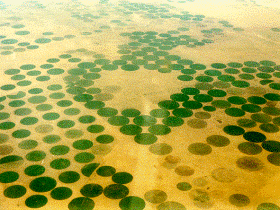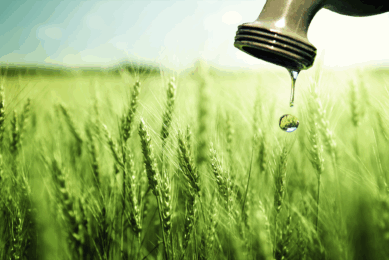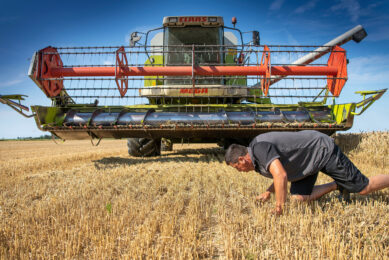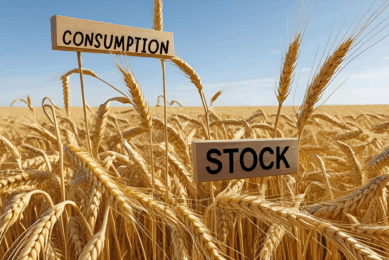Saudi to grow less wheat, rely on imports

Saudi Arabia would discourage cultivation of water intensive crops such as wheat and corn and rely more heavily on imports to secure future consumption.
Due to its desert location Saudi Arabia is among the least food self-sufficient nations, needing to import almost its entire requirement of major foodstuffs.
However, since the late 1980’s Saudi Arabia has been self-sufficient in wheat, even net exporting for a time.
This was made possible through high-level state assistance, including subsidies and tax breaks, while domestic water supplies used in the irrigation-heavy activity (see photo: wheat fields) competed with household water consumption, according to ‘Saudi Arabia Agribusiness Report Q1 2010’ released by Business Monitor International (BMI).
The desert nation has been increasingly struggling with trying to sustain a domestic agricultural sector, despite low levels of renewable water and very limited arable acreage.
The government seems to have lost patience with single-handedly supporting local farmers, and would rather the kingdom become a net grains importer than continuing to drain a beleaguered, yet socially vital, water supply.
Phase out crop production
Domestic food self-sufficiency is showing little sign of improving popupation growth is putting more pressure on feed and food issues.
In a bid to help preserve scarce and dwindling water supplies, the Saudi Arabian government intends to completely phase out the production of all crops it deems as particularly water intensive and thus a drain on non-renewable resources.
These include important grains such as corn and wheat, which are vital for both household consumption and as a source of animal feed, meaning that the kingdom will have to rely more heavily on imports to secure future consumption.
The Saudi government has reportedly said that it wants to rely on wheat imports entirely by the year 2016.
BMI report forecasts domestic Saudi wheat production to slide by over a quarter during the course of the new outlook period 2009-2014.
This will come as a result of the government actively reducing imports from local farmers by 12.5% year-on-year to 2016, which will have the obvious effect of reducing producer sentiment.
Corn acreage is expected to expand despite the government’s objectives. Corn production is already marginal, yet the increasing popularity of the grain as animal fodder – plus a tighter, more price supportive national and international market compared to wheat – should underpin a higher sentiment among local farmers.
With water availability a constant scourge, corn production is unlikely to extend beyond a few wealthy producers with suitably efficient technology to enable profitable returns.
Dairy sector expands
Domestic investors are increasingly looking to overseas farmland to help provide a degree of stability and lessen an overwhelming reliance on food imports. Local agribusiness firms – and increasingly private equity companies – have been keen to exercise their financial might.
The dairy industry – and particularly the value-added sub-sectors – already commercially and technically well developed, has attracted a number of key players seeking to expand domestically, as well as to make their presence felt throughout the wider Gulf and Middle East region.
This sector boasts some of the most technically advanced and efficient technology seen anywhere in the Middle East, if not the world. BMI expects investment to be attracted to the dairy industry from 2010 and beyond.











